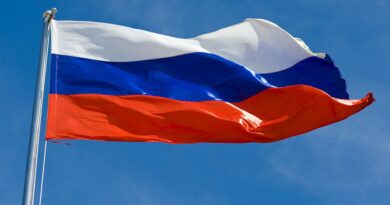The American far-right’s Russian embrace | On Point

Some of the loudest voices trumpeting the Russian government’s line right now are in the United States — on the far-right and on TV.
Example: Russian foreign minister Sergey Lavrov says the U.S. is helping Ukraine develop bioweapons.
“Those laboratories are created by the United States all over the world. Ukraine is probably the biggest project for the Pentagon,” Lavrov said.
Then, Tucker Carlson picks it up.
“Secret biolabs? Like the secret biolabs Ukraine definitely doesn’t have? Ukraine has those? Yes, it does,” Carlson said.
Journalism fact checks and formal denials from the United States government make no difference. Influential voices on the far-right still say:
“They reported that this story about these bio research facilities in Ukraine was a conspiracy theory. When USA Today and Snopes say it’s … a hoax, you almost know it’s true,” Dan Bongino said.
Today, On Point: The American far-right and its tight Russian embrace.
Guests
Jason Blazakis, senior research fellow at the Soufan Center, a non-profit research center. Director of the Middlebury Institute of International Studies’ Center on Terrorism, Extremism and Counterterrorism. (@Jason_Blazakis)
Natalia Antelava, editor-in-chief of the online news platform Coda Story, which focuses on disinformation and authoritarian technologies. She writes the weekly newsletter Disinfo Matters. (@antelava)
Jack Beatty, On Point news analyst. (@JackBeattyNPR)
Also Featured
Jessica Brandt, policy director for the Artificial Intelligence and Emerging Technology Initiative at the Brookings Institution. (@jessbrandt)
Interview Highlights
On how disinformation loops impact the public in Russia
Natalia Antelava: “There are a few things that really stand out. I mean, first of all, I have to say, you know, Jason talked about the pushback against liberal values that’s happening in Russia right now. I would describe it as in much stronger terms. It’s a full on war on liberal values that’s happening in Russia now. And it’s happening most publicly on state-funded TV. There is no other television anymore in Russia since the invasion of Ukraine. All the independent channels have been booted out of the country, shut down. And the Russian television has actually stopped all of its entertainment programing, and it’s now gone into full on propaganda mode.
“And probably, Tucker Carlson is possibly one of the most reasonable, mildest things that you will hear on Russian TV. I’m not exaggerating. I was just listening to one of the recent flagship programs that featured this political scientist that gets rolled out a lot on Russian state TV, calling for the nuclear war with Europe. You know, screaming Europe, You need to understand that you will get a nuclear war. There will be a nuclear war. Calling for Russia to ‘denazify’ Poland now. So the argument used for, you know, Ukraine now applying it to Poland.
“And what’s really important to understand about all of it is that this has been happening on Russian television for years and years. Since about 2011, when Putin really upped its rhetoric and really started building his incredible — on the basis of sort of existing Soviet-era propaganda kind of disinformation experience. He started building this incredible disinformation machine that is now, you know, working, churning out so many narratives.
“And I think the loop that we’re talking about here, you know, it’s more of a narrative loop rather than necessarily disinformation loop. I mean, some of it is definitely lies, but some of it, it’s the narratives. I’m so struck to hear Wendy Rogers say Overton window. Because I mean, I don’t know how many of your listeners know about Overton windows, but I learned that Overton windows, where you know this kind of a term to describe the realm of acceptable can be pushed further and further.
“I learned the term when I was covering the war in Ukraine in 2014, during the first Russian invasion that followed the annexation of Crimea and everyone in the regions of Donetsk and Luhansk, where the separatist movement was turning, very much fueled by the hatred that was happening on Russian television. It was turning into a real war. You know, it was kind of the hatred was spilling out. The propaganda was spilling out and turning into real violence. Everyone I spoke to a year later after the war began would talk to me about Overton windows. You know, from young students to pensioners to everyone who was watching Russian TV talked about Overton windows. Now they reached the United States.”
On how these key narratives become a corroding force to democracy
Jason Blazakis: “I think this is an important conversation, and I hope it continues after we get past the break because this idea of the narrative is the first step in the disinformation cycle. Picking what could be divisive within a society is so critically important. And at the Soufan Center, where I work, where we’ve written a number of reports on disinformation, we are tracking a lot of different narratives that absolutely resonate with American audiences.
“And that’s really important because the Russians have identified key narratives that may create even further discord within the American population, particularly as it relates to the Russia Ukraine conflict. And without identifying a good narrative, you’re not able to disseminate it and hit it with the audience that you’re trying to impact. So these narratives are a crucial component of this conversation.”
Vladimir Putin first pushed a narrative about Nazism in Ukraine. And then Lara Logan picked it up, and then the Russian government amplified her remarks on Twitter. What’s behind the Nazis in the Ukrainian military story?
Natalia Antelava: “There is a kernel of truth, as you said, and Putin is very, very good at exploiting the truth. He’s better at that than telling lies. There is a far-right wing to the Ukrainian militia. There are far-right supporters. And there are some neo-Nazis in Ukraine. There are also neo-Nazis in France and in Germany and in any other European country. Many more than in Ukraine, in fact. So, you know, the whole argument comes straight from the Kremlin playbook. And frankly, they exist. It’s true, but this is not the main story.
“And you know, you asked about when skepticism, which I agree with you, it’s absolutely necessary. When does it become corrosive? And I think it’s so important to understand sort of the delivery mechanisms of these narratives because the U.S. has spent millions on countering Russian disinformation over the years. But because of the way the Russian disinformation works, debunking it really doesn’t work. Because Putin has built a multimillion dollar media networks … and also dozens and hundreds, I mean, tens of thousands of tiny websites you’ve never heard of and social media channels and Twitter accounts and influencers.
“And … he did it by tapping masterfully into existing fears and legitimate grievances of each audience that they addressed. And we’re talking about far-right now. But for example, he’s also been really good with the very successful Russian narratives, are very successful, with the far left in the West. And the U.S. invasion of Iraq was a gift to Russia because it he turned what should have been a really legitimate debate about the disaster that was caused by the Iraq War, turned into just two rounds of exhausting what-aboutery. Which in turn made him, you know, a kind of a hero for the European far left. So, you know, it’s the truth that he exploits that are really dangerous.”
Is what’s happening regarding Russia and the American far-right different than propagandistic tools that the United States or the West has used before?
Jason Blazakis: “I think there is a very significant difference. If you go back to the time period in which the United States was battling the Soviet Union in the information warfare space, the United States was trying to push forward through, you know, dissidents who defected to the United States or other places in the world like Europe to convey the message of what was happening inside the Soviet Union, that the Soviet Union messaging was predicated on falsehoods.
“And I think the United States has tried to push through outlets like The Voice of America. So what is the world like today, through the lens of a fact? And I think this is another reason why the Russians are so upset with how the information warfare is going in Ukraine. Zelenskyy has got facts on his side, just like the United States had facts on its side against the Soviet Union. And I think that pushes them towards pushing these false narratives. So I don’t think there is a moral equivalency between U.S. engagement in the information operations space and the Russian Federation and, of course, the Soviet Union before that.”
On what can be done to protect democracy
Natalia Antelava: “I think lots and lots can be done. First of all, protect your democracy. You know, that is the most important thing. There is no comparison between Russia Today and Voice of America because there is no editorial process at Russia Today. The editorial decisions are made in the Kremlin. It is completely different. And this whataboutism, it’s understandable, you know, I mean, because the Iraq invasion is a good example. What about the Iraq invasion? Yes. You know, societies need democratic institutions and a debate about big issues.
“But we also need to remember that leaping into whataboutism is a bit like going to a friend’s father’s funeral and saying, Well, yes, condolences. But what about my father who died two years ago? You know, it’s not a helpful in terms of framing. And finally, I think one other thing to understand is that for Putin, everything is information war. There is no such thing as media. This show is information war for Putin. So that’s how he’s framing the world. So, you know, I think the most important thing when you ask what it is to be done, I think the very simple thing, something that everyone can do is pay attention and keep yourself informed with good information. That was a good first step.”
Related Reading
Coda Story: “Russian State TV replaces entertainment with war propaganda” — “Disinfo Matters is a weekly newsletter that looks beyond fake news to examine how manipulation of narratives, rewriting of history and altering our memories is reshaping our world. We are currently tracking the war in Ukraine. Also in this edition: we look at disinformation networks beyond Western bubbles and pups for Putin.”
Brookings: “Popular podcasters spread Russian disinformation about Ukraine biolabs” — “In recent weeks, Russian officials and state media have seized on a fresh piece of disinformation to justify the invasion of Ukraine: that the United States is funding the development of dangerous biological weapons in Ukraine. This claim, which has no basis in fact, has not been confined to Kremlin propaganda. Popular podcasters in the United States have repeated and promoted it for their own purposes.”


